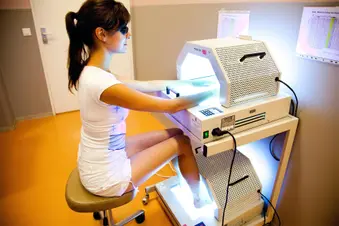
If the medicine you put on your skin isn't doing all that it needs to, your doctor may suggest adding phototherapy to your psoriasis treatment. It uses ultraviolet rays that come from sunshine, artificial lamps, or lasers to slow skin cell growth and ease your symptoms.
Types of Phototherapy
Sunlight. Too many rays coming directly from the sun can make your symptoms worse and raise your chances of getting skin cancer. If your doctor tells you to get some sun each day, about 20 minutes a day should be enough. Use a sunscreen with zinc oxide and an SPF of 30 or higher on areas of your skin that don't have psoriasis.
UVB (ultraviolet B). Your doctor can treat you with UVB rays from a phototherapy machine in their office. You can also get one to use at home. But the lamps can give off ultraviolet A (UVA) rays. Both UVA and UVB rays are linked to skin cancer. Talk to your doctor about how to protect yourself from the cancer risk while being treated.
You'll probably need phototherapy treatments 3 days a week for 2 to 3 months. Your doctor might suggest you use UVB treatment along with another kind of therapy, like a cream made from coal tar. They may call this the Goeckerman regimen. Another combination treatment pairs anthralin-salicylic acid paste with ultraviolet light. You might hear this called the Ingram regimen.
PUVA (psoralen plus ultraviolet A). This treatment combines UVA lamp sessions with a drug called psoralen. You either take the drug as a pill or put it on your skin as a cream, lotion, gel, solution, or ointment. It makes your skin more sensitive to light. The process is called photochemotherapy. You'll probably go to your doctor's office 2 or 3 times a week for a total of 25 to 30 sessions.
PUVA clears up psoriasis quickly with long-lasting results. But using it for a long time can raise your chances of skin cancer. Because of that, it’s typically only recommended for severe cases or when other treatments haven't worked.
The treatment also has side effects such as:
- Nausea
- Exhaustion
- Headaches
- Burning and itching
Because psoralen makes your body extra sensitive to light, you need to protect your skin and eyes after taking it. Wear glasses that block ultraviolet light, and wear sunscreen for at least the first 24 hours after treatment.
Lasers. These highly focused beams of light target your psoriasis patches, not your healthy skin. This cuts down on side effects and may lower your chances of skin cancer. You'll also need fewer treatments compared with other types of light therapy.
The excimer laser uses focused, high-energy ultraviolet B light. It can help patches get better faster than other methods. You usually get this treatment in your doctor's office twice a week for 4 or 5 weeks.
Side effects from laser therapy are generally mild, but some people say it can hurt a bit. You may also have bruising, sunburns, and possibly scarring at the spots that have been treated.
After laser treatment, you should stay out of sunlight and be careful not to injure the area. Call your doctor if you see blisters.
Take Caution
If you use any kind of phototherapy, including natural sunlight, be careful not to get too much sun. Don't sun yourself in the yard or go out for a walk without sunscreen, for example. During an artificial light session, use sunscreen or wear clothes that cover up areas that don't need treatment.
Many things can make you more sensitive to light, like some blood pressure drugs, antibiotics, St. John's wort, and even celery. Stay away from these while you're getting phototherapy. And have regular skin exams to check for signs of skin cancer.
Show Sources
(Photo Credit: Phanie/APHP ST-LOUIS-GARO/Medical images)
SOURCES:
Bruce E. Strober, MD, PhD, associate professor, vice chair, director of clinical trials, department of dermatology, University of Connecticut; consultant to NexGenix Pharmaceuticals Holdings, Amgen, Biogen, Genentech, Fujisawa, and 3M.
Jeffrey M. Weinberg, MD, Mount Sinai St. Luke's, New York; associate clinical professor of dermatology, Columbia University College of Physicians and Surgeons; consultant to Amgen and Genentech.
National Institute of Arthritis and Musculoskeletal and Skin Diseases.
American Academy of Dermatology.
National Psoriasis Foundation: "Phototherapy."
Abel, E. "Psoriasis," ACP Medicine, BC Decker, 2005.